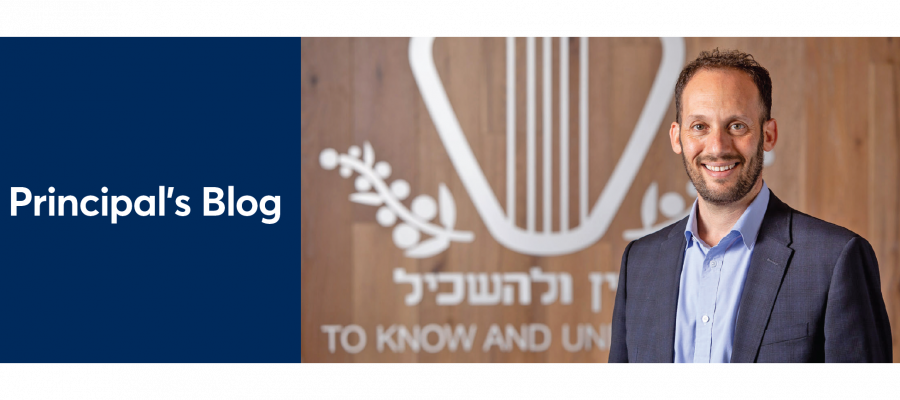
Knowing ourselves so we can choose
This week our Year 7 cohort delighted their parents, grandparents and special friends with their celebration of the Kabbalat Mitzvah. This program is one that is focused on acknowledging the special stage of life that accompanies the B’nei Mitzvah years.
In Jewish custom it is said that one does not have a Bar or Bat Mitzvah, one becomes a Bar or Bat Mitzvah. In this way B’nei Mitzvah is not an event but a rite of passage into a new stage of maturity and commitment.
In our tradition, this life stage is marked by an individual becoming accountable for their own actions, rather than vicariously through their parents. In this way, Kabbalat Mitzvah occurs at a time when our students become responsible for performing their own mitzvot.
The event is designed around granting our students agency in instructing their families around certain mitzvot. This year the event focused on exploration of t’fillin, mezuzot, tzitzit and the words of the Sh’ma and V’ahavta prayers.
The evening began with an address from Rabbi Allison Conyer where she encouraged our students to see themselves as taking their turn in the lineage of their families. She built an extended metaphor around the game Catch, and asked the students to consider their identity through the framework of a ball first thrown by God to Moses and then being passed on to Am Yisrael and through the generations. Rabbi Allison asked our students to step up and catch the “ball” so that they could one day pass it on to future catchers.
In keeping with Rabbi Conyer’s metaphor the Kabbalat Mitzvah ceremony involves throwing the ball between the generations. We were lucky to hear from a student, a parent and a grandparent on what this special stage means for them.
First we heard from one of our Year 7 students, Layla. Layla spoke of the value of Jewish education. She said that it was vital to acquire knowledge of culture, history, traditions and practices so that they inform our lives and that we are empowered to pass them on to the next generation. Layla also spoke of how Jewish education has helped to form her Jewish identity. She said that she was inspired to turn her education into action through both learning about and choosing to practise mitzvot in a way that is meaningful for her.
Next we heard from a parent, Daniel Aghion. Daniel spoke about the fact that he did not receive a Jewish education at school and so his knowledge and connection came from his family and from his Jewish youth movement.
Daniel said that he had been recently asked about what it is that he values most in his Jewishness. He identified three components. First was family which is where much of his Jewish tradition, custom and practice plays out. Second was debate. Daniel spoke of the value of Jewish debate as it allows for intellectual engagement and agency which are vital parts of his Jewish identity. Thirdly, Daniel referred to community. As someone who exemplifies service to the Jewish community in his work leading the Executive Council of Australian Jewry, Daniel has worked to strengthen the connections that bind Jewish people in Australia, however he spoke of the sense of warmth when he established such a connection with a taxi driver in the Netherlands who he discovered was Jewish. The driver even wished him a “zei gezunt” (be well) in Yiddish.
Finally we heard from former KDS Principal and Year 7 grandparent, Margaret Taft. She asked the students what was the greatest gift that they have. Some said family, one said a Nintendo Switch. She said the answer she was looking for was a “Jewish education.”
Margaret introduced the students to Aristotle and the fact that he would start his lessons with two words – “Know thyself”. For Margaret, this is the value of a Jewish education as it allows the students to connect with their individual Jewish identity in a way that speaks to them and helps to define who they are.
The event closed with the wise words of Director of Jewish Life and Learning, Ilan Bloch, who encouraged our students not to see themselves as “the chosen people” but rather to become a choosing people. Ilan exhorted our students to opt in to Jewish life, learning and practice and suggested that this will prove to be enriching and rewarding throughout their lives.
Through events like our Kabbalat Mitzvah, we constantly assist our students to foster their own unique sense of connection and meaning in their emerging Jewish identities. By inviting our families to participate in such rites of passage and enveloping our students in their love and support, we encourage our students to “know themselves” and to find ways to be choosing people in ways that resonate for them.
Shabbat Shalom,
Marc
